
PUMPA - SMART LEARNING
எங்கள் ஆசிரியர்களுடன் 1-ஆன்-1 ஆலோசனை நேரத்தைப் பெறுங்கள். டாப்பர் ஆவதற்கு நாங்கள் பயிற்சி அளிப்போம்
Book Free DemoThe main characters of the story "Bringing up Kari" are Kari and the narrator. Kari was just a five-month-old baby elephant when he reached the narrator. The narrator was not only the caretaker but also his best friend. He treated Kari like a baby.

Kari and the narrator
When he was a little boy, he could reach Kari's back if he stood on tiptoe.

Narrator stood on tiptoe
Both of them grew together, and the narrator probably didn't know how tall Kari was. He lived in a pavilion under a thatched roof; it rested on thick stumps so that it would not fall when Kari tried to move around.

Kari enjoys his morning bath
While bathing, Kari would squeal in pleasure. He would remain in the water for a long time. The narrator compared Kari's skin to the ebony wood. His skin would be shinning after his long lasting bath. Kari felt very fresh after his morning bath.

Kari's skin compared to an ebony wood
The narrator used to leave Kari near the edge of the forest and Kari would roam near by places. Later on, the narrator went inside the deep forest to get some delicate twigs for Kari. Though Kari did not eat much, he needed forty pounds of twigs a day. He liked to play with the remaining twigs. The twigs were very light and delicious. Kari would prefer such kind of twigs to eat.

Kari eating twigs
To cut the twigs, the narrator needs to carry a sharp hatchet. Hatchet is a kind of axe used for breaking twigs. It takes half an hour to sharpen the hatchet because the sharpened hatchet would cut the twigs perfectly. An elephant would not touch a mutilated twig because it may hurt him.

Hatchet used for cutting woods and twigs
The narrator had to climb different varieties of trees to get the most delicate and tender twigs.

Delicate twig
It was difficult to collect saplings and twigs for Kari. He liked to eat the young branches of the banyan tree. One spring day in March, when he was collecting some young branches, he suddenly heard a call. It was the cry of an elephant. The sound made him to think that Kari was in danger and somebody was hurting him. He felt that it was the cry of a baby. Immediately, the narrator came down from the tree and ran very fast to the edge of the forest where he left him. But Kari was not there.

Narrator climbing the banyan tree for saplings and twigs
The narrator looked all around, but he could not find Kari anywhere.
He went near the edge of the water and saw something black above its surface. Finally, he realised that it was the trunk of his beloved elephant, Kari. He thought that Kari was drowning. The narrator was helpless because the elephant was too big for him. Kari weighs four hundred pounds and even higher than him. At last, the narrator saw Kari's back was lifting. When he saw the narrator, Kari began to trumpet and struggled up to the shore.

The narrator saw something black above its surface
Kari pushed him into the stream. The narrator saw a boy lying on the bottom of the river. He dived and pulled the body of the drowning boy to the surface. However, the narrator was not a good swimmer. So he could not come ashore. The current flow of water began to drag him down.

Boy drowning to the surface
Usually, Kari was slow because of his heavyweight. On seeing both of them, Kari understood that they were in trouble. He suddenly moved like a hawk and came halfway into the water by stretching out his trunk. The narrator raised his hands to hold it, but he got slipped. He noticed that he was drowning under the water again, but this time the narrator found that the water was not so deep and he was floating at the bottom of the water. Then, he doubled his feet and shot upwards like an arrow.

The narrator and little boy were drowning
Surprisingly, he was holding the drowning boy with his hand. The narrator felt something like a round was coming around his neck and he got scared. He thought that some water animal was trying to swallow him. Finally, he heard Kari's squeal and realised that it was Kari's trunk. He pulled both of them back to the river bed.

Kari saved the narrator and the young boy
The narrator was comparing Kari with a baby. He had been trained to be good. One must tell him when he was naughty, or else he would be behaving more mischievous than ever.
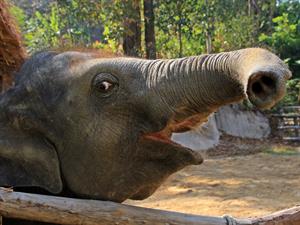
Naughty and mischievous Kari
Kari was fond of bananas. On a fine day, someone gave him a bunch of ripe bananas to eat. He liked it very much. From that day onwards, he had a great love for bananas.
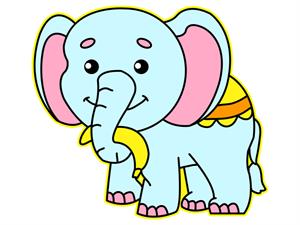
Kari was fond of bananas
The narrator's family used to keep large plates of fruit on a table near a window in the dining-room.

Fruits on narrator's dining-table
One day, all the bananas from the table got vanished, and his family members blindly blamed the servants for eating all the fruits in the house. After a few days, he noticed the same thing happened again. This time they accused him, and he knew that he had not done that. Finally, he became very angry with his parents and servants for accusing him. The next day, the narrator found all the smashed bananas were in Kari's pavilion. He was astonished because he had never seen any fruit in the pavilion before except the leaves and twigs.
The next day, the narrator was sitting in the dining-room and thinking about whether he could take some fruit from the table without his parent's permission. Suddenly, a black thing, which looked like a snake, appeared through the window and soon disappeared with all the bananas.
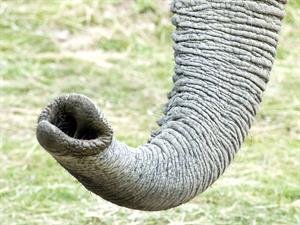
Kari's trunk looks like a snake
The narrator came out of the house with great fear and thought that it must be a terrible snake. He felt that the snake would come inside the house and kill all of them.
When the narrator went out, he saw Kari's back was disappearing into the pavilion. He was very much afraid, and he wanted Kari's company to cheer him up. Then he ran after him and found that Kari was eating all the bananas.
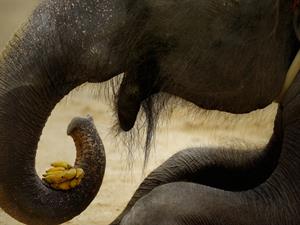
Secretly, Kari was eating all the bananas
The narrator was astonished. The bananas were extremely destroyed and lying scattered all around Kari. When Kari stretched out his trunk, it looked like that of a snake. Finally, he realised that Kari was the culprit. He went near him, pulled out his ear, and showed him to his parents that Kari was the thief. After that, the narrator scolded Kari for stealing the bananas. He warned him that he would punish him with a whip if he stole again. Kari knew that everyone must be angry with him. From that day onwards, Kari did not steal anything from the dining-room.
If anybody gave him any fruit, he would always thank them and receive it.
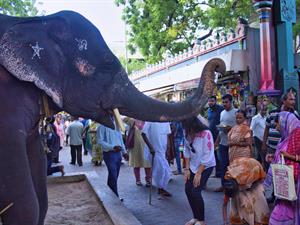
Kari thanking and blessing people
From that day onwards, Kari started obeying the narrator's words. The narrator, while speaking about Kari's character he remembered about Kari's revenge. For instance, on a fine day narrator and Kari went for bathing. At that, Kari met a very naughty boy. The little boy used to beat Kari without any reason. The narrator noticed that and took Kari away. Kari kept all these things in his mind. After long days Kari met that boy again. On seeing that boy, Kari remembered the older incidents and started attacking the boy. An elephant accepts the punishment when he does anything wrong. If we punish him without any reason, he will remember it and pay it in return.
The narrator was not only his caretaker, but also he was a good trainer. He taught him like a child. He used to train Kari a few signals to learn when to sit, stand, walk and run. The narrator used few words to teach Kari. They are 'Dhat' and 'Mali'.
Kari used to sit down when he heard the term 'Dhat'.

Kari sat down on hearing 'Dhat'
On hearing the word 'Mali', he knew that it was the signal to take a walk.

Kari took a walk on hearing 'Mali'
Kari took a few weeks to learn the words. He knew 'Mali' after three lessons, but it took three weeks to learn 'Dhat'. Kari was not good at sitting. An elephant must be taught when to sit down because the elephant grows faster than human beings. If the master or caretaker did not teach an elephant when to sit down, the caretaker should always carry a ladder with him. Whenever the caretaker wants to climb on the elephant, he should use a ladder for it. To avoid these kinds of problems, the caretaker can teach an elephant to sit down properly.
The most difficult and important thing to teach an elephant was a master call. Master call is a type of sound produced when a snake and a tiger fight with each other. The sound should be very strange and fearful. An elephant must know about a master call. The master teaches his elephant about the master call by making the sound in his ear. When the master is in any crisis, if there is no way to come out from the forest he can give a master call. When the master call reaches the elephant, it thinks that his master is in trouble. The sound passes through the wind and it finally reaches the ear of the particular elephant.
The trained elephant would reach the spot by pulling out the trees in front of him.

Kari reached the spot by pulling out trees
When an elephant hears the master call, he immediately arrives at the particular spot by pulling down the trees one by one. On seeing the behaviour of an elephant, the other animals in the forest, like monkeys, stags, and tigers, ran away from them to save their lives.

Animals in the forest got frightened
In this way, an elephant makes a path out of the forest. An elephant takes five years to learn a master call. Likewise, Kari also took five years to learn his master call.
Reference:
Kari thanking and blessing people: Arpan Bhatia / Shutterstock.com
Narrator climbing the banyan tree: EA Given / Shutterstock.com
Kari saved the boy and narrator: Tony Prince / Shutterstock.com